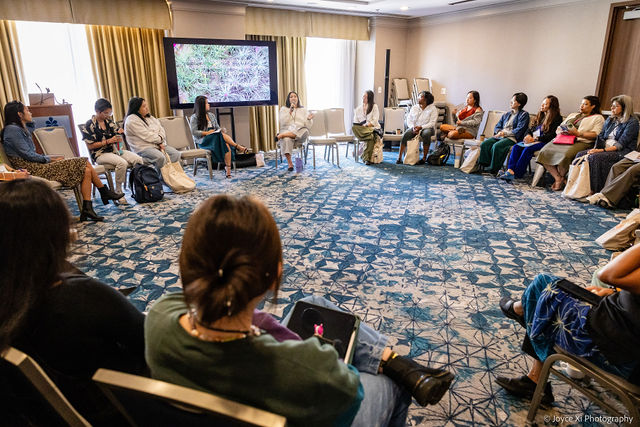By Samantha Miller
Audri Lu-Uhlken’s journey to pursuing a Master of Social Work (MSW) at the University of Iowa is deeply intertwined with her personal and professional experiences. Born and raised in Des Moines, she grew up in a family of Tai Dam and Lao refugees. Her parents’ stories of resilience shaped her perspective on identity and community, though it wasn’t until her mid-20s that she began exploring her heritage more deeply.
"I was 28 when I first started to think about my identity and learn about Asian American history. It felt like an awakening; a calling to be a part of the work,” Lu-Uhlken said.
This awakening became a turning point, inspiring her to work toward positive change within marginalized communities.
Changing careers
After earning a journalism and communications degree with an entrepreneurship certificate in 2012 from the University of Iowa, Lu-Uhlken’s career began in advertising and digital sales. Despite success in the field, she sought a more meaningful path. A desire to give back led her to Monsoon, an Iowa-based organization supporting survivors of gender-based violence in Asian Pacific Islander (API) communities.
Initially joining as a youth program coordinator, she then took a job with Des Moines Public Schools, where she served as a community coordinator and advocate for families in need. Both roles highlighted systemic gaps in mental health resources for marginalized communities, sparking her decision to pursue an MSW.
“From both jobs, I was able to take a step back and see what was most needed – more culturally-specific resources for mental health and well-being for communities of color,” Lu-Uhlken’s said.
How an MSW is helping her current and future work
Now enrolled in the online MSW program, Lu-Uhlken’s balances her coursework, motherhood, and work at Monsoon, where she oversees its transitional housing and community health programs.
The housing program supports survivors of violence by providing rental assistance and wraparound services for up to 24 months. It’s a groundbreaking initiative offering survivors safety and independence. Lu-Uhlken not only manages the logistical aspects of housing survivors but also ensures they are set up for long-term success by offering learning opportunities on critical skills like goal setting and informed decision making.
“We’ve found that this is the first time many of our clients feel safe in their own homes,” Lu Uhlken’s added.
Through the program’s empowerment series, survivors learn essential skills like tenant rights. However, Lu-Uhlken’s says more well-being resources are needed.
“Many survivors are used to constant chaos and are in need of more tools to help regulate themselves,” she said.
Future plans for the program include pivoting the series to focus more on well-being healing.
Monsoon’s community health program, which emerged from a needs assessment conducted with the University of Iowa Rural Public Health, addresses broader health and advocacy needs in the API community. Lu-Uhlken plays a pivotal role in this program by developing and implementing programming focused on addressing health issues that impact API communities in Iowa.

This program features intimate support groups for API elders and mothers, providing safe spaces to share resources, learn, and heal. The mothers group, for example, recently tackled the complex topic of talking to children about racism.
“We’ve found that mothers of color from marginalized communities often lack spaces where their stories and lives are centered,” she said.
Lu-Uhlken’s academic coursework is enhancing her work at Monsoon, strengthening skills she currently applies directly in her role, including motivational interviewing and reflective techniques.
Her ultimate goal after graduation is to become a licensed mental health practitioner and inspire others to join the field.
“The need for mental health practitioners in our community is greater than ever,” she added.
